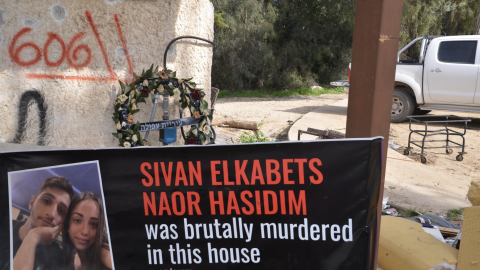Kfar Aza, Israel
In the ruins of a kibbutz targeted by Hamas on October 7, the surprise and horror of that day is visceral. The displaced survivors are still in shock. Some had family members taken. Some are still held by Hamas. I sat with a frightened mother desperately trying to find a way to save her kidnapped child—gone for over 100 days.
Kfar Aza was the home of folks who hoped for peace—including young people full of life and openness toward those who went on to slaughter them.
Israelis, from officials to soldiers to ordinary citizens, tell you through their pain that the October 7 attacks changed everything. Now, they are fighting for their country in a way most could not have conceived of mere months ago.
The threats from Hamas in Gaza and Hezbollah in Lebanon have displaced more Israelis than any event in the history of the country. This danger, coupled with the call-up of reserve troops, is disrupting a substantial part of the Israeli workforce, economy, and daily life. The possibility of attacks from the West Bank raises the specter of a three-front war. Accounting for the long-range strikes by the Houthis and attacks from Syrian and Iraqi militias, a five- or six-front war is conceivable.
Israelis have long believed in the importance of strength in maintaining deterrence. Now they have come to understand that strength alone is not enough. They have to pursue deterrence actively.
Several colleagues and I traveled to Israel to get a direct look at the security situation about three months after the worst day of death in the history of Israel. We brought two questions: How do Israelis understand their situation? And what should the United States do to support them and our other allies in the Middle East?
Israelis point to three causes of the horror of October 7.
First and most profound is a terrorist enemy that has nurtured generation after generation of murderous and genocidal young men. Palestine’s leaders have been supported by misguided international aid and the assistance of those who call themselves Israel’s allies. This is now simply intolerable, and the two-state solution is a dead letter. The terrorist forces need to be contained, weakened, and destroyed. Americans might ask themselves, What would we do? The measures required may be uncomfortable to contemplate, let alone execute. But they are not difficult to comprehend.
Second, there were obvious failures among intelligence, military, and political leaders and institutions in Israel. Israelis will get to the larger task of accountability. But for now, there is a growing group led by reservists that is insisting that political bickering and divisiveness stop until the war is won.
Third, however, a deeper, more strategic cause is coming into view. Its central insight is that Israel has been disproportionately reliant on an essentially passive defense strategy, one that is inadequate for a deadly and worsening threat.
The clearest example is Israel’s reliance on the Iron Dome anti-missile system. True, it is impressive. But it is deeply flawed in two strategic respects. The system’s costs and requirements now make it vulnerable to the sheer numbers of rockets that threaten Israel from multiple fronts—and the promised Iron Beam directed energy weapon is not likely to change this. Second—and worse—this “Iron Dome thinking” put Israel in a position of accepting rocket attacks by the hundreds rather than taking action to stop them before their launch. The people of Kfar Aza lived with rocket and bomb shelters everywhere, with 15 seconds after an alarm to get inside one for safety. This was their normal—at least until October 7.
Passive defense is not deterrence. It creates time and space for an enemy to develop successful vectors for new attacks—arsenals of rockets, an infrastructure of tunnels, and training in techniques of infiltration and murder. Moreover, Hamas and Hezbollah’s terrible answer to the Iron Dome is the use of human shields: first Palestinian civilians, and now Israeli and American hostages.
As the Israelis face this strategic cause of October 7, they will also see that their indispensable ally, America, pressed them to adopt the deadly policy of restraint—and continues to do so today. American policy promised a grand solution and would not support proactive deterrence. Israel’s indispensable ally created—and maintains—the strategic conditions for a long erosion of Israeli security and the extreme crisis that is all too visible today.
Israelis are most at risk, but all US allies in the Middle East are dependent on a strategic awakening in America: the recognition that deterrence is not something a state can achieve and then take for granted as the status quo. Successful deterrence requires active pursuit—together. The false conception of deterrence—be strong and stand back—has failed. The Israelis are now trying to reverse this error. They need America to join them.

















